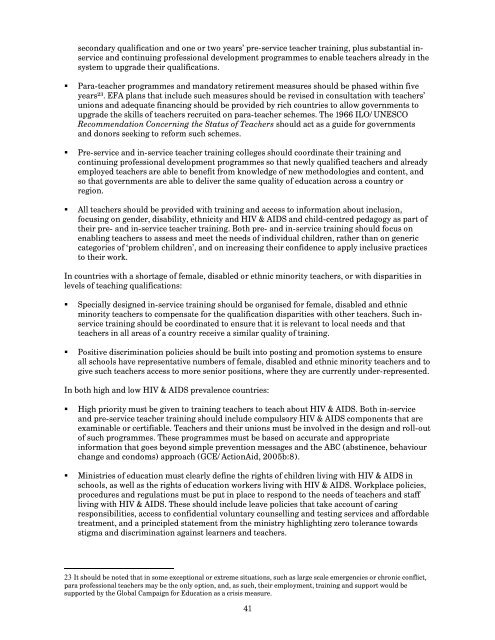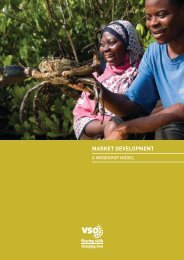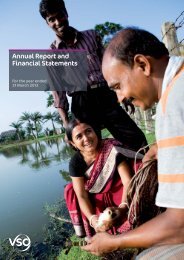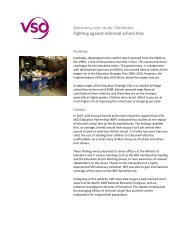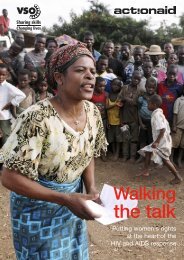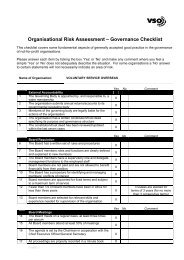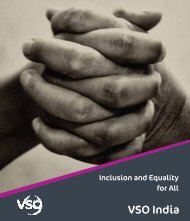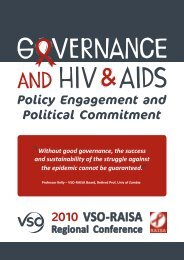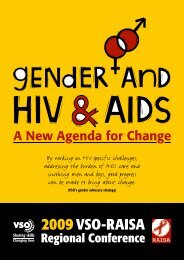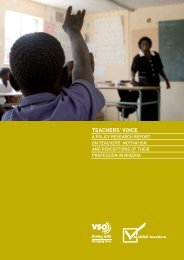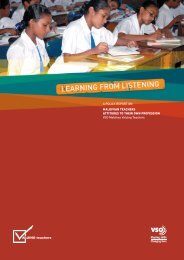Teachers for All â GCE policy briefing (566KB) - VSO
Teachers for All â GCE policy briefing (566KB) - VSO
Teachers for All â GCE policy briefing (566KB) - VSO
You also want an ePaper? Increase the reach of your titles
YUMPU automatically turns print PDFs into web optimized ePapers that Google loves.
secondary qualification and one or two years’ pre-service teacher training, plus substantial inserviceand continuing professional development programmes to enable teachers already in thesystem to upgrade their qualifications.• Para-teacher programmes and mandatory retirement measures should be phased within fiveyears 23 . EFA plans that include such measures should be revised in consultation with teachers’unions and adequate financing should be provided by rich countries to allow governments toupgrade the skills of teachers recruited on para-teacher schemes. The 1966 ILO/UNESCORecommendation Concerning the Status of <strong>Teachers</strong> should act as a guide <strong>for</strong> governmentsand donors seeking to re<strong>for</strong>m such schemes.• Pre-service and in-service teacher training colleges should coordinate their training andcontinuing professional development programmes so that newly qualified teachers and alreadyemployed teachers are able to benefit from knowledge of new methodologies and content, andso that governments are able to deliver the same quality of education across a country orregion.• <strong>All</strong> teachers should be provided with training and access to in<strong>for</strong>mation about inclusion,focusing on gender, disability, ethnicity and HIV & AIDS and child-centred pedagogy as part oftheir pre- and in-service teacher training. Both pre- and in-service training should focus onenabling teachers to assess and meet the needs of individual children, rather than on genericcategories of ‘problem children’, and on increasing their confidence to apply inclusive practicesto their work.In countries with a shortage of female, disabled or ethnic minority teachers, or with disparities inlevels of teaching qualifications:• Specially designed in-service training should be organised <strong>for</strong> female, disabled and ethnicminority teachers to compensate <strong>for</strong> the qualification disparities with other teachers. Such inservicetraining should be coordinated to ensure that it is relevant to local needs and thatteachers in all areas of a country receive a similar quality of training.• Positive discrimination policies should be built into posting and promotion systems to ensureall schools have representative numbers of female, disabled and ethnic minority teachers and togive such teachers access to more senior positions, where they are currently under-represented.In both high and low HIV & AIDS prevalence countries:• High priority must be given to training teachers to teach about HIV & AIDS. Both in-serviceand pre-service teacher training should include compulsory HIV & AIDS components that areexaminable or certifiable. <strong>Teachers</strong> and their unions must be involved in the design and roll-outof such programmes. These programmes must be based on accurate and appropriatein<strong>for</strong>mation that goes beyond simple prevention messages and the ABC (abstinence, behaviourchange and condoms) approach (<strong>GCE</strong>/ActionAid, 2005b:8).• Ministries of education must clearly define the rights of children living with HIV & AIDS inschools, as well as the rights of education workers living with HIV & AIDS. Workplace policies,procedures and regulations must be put in place to respond to the needs of teachers and staffliving with HIV & AIDS. These should include leave policies that take account of caringresponsibilities, access to confidential voluntary counselling and testing services and af<strong>for</strong>dabletreatment, and a principled statement from the ministry highlighting zero tolerance towardsstigma and discrimination against learners and teachers.23 It should be noted that in some exceptional or extreme situations, such as large scale emergencies or chronic conflict,para professional teachers may be the only option, and, as such, their employment, training and support would besupported by the Global Campaign <strong>for</strong> Education as a crisis measure.41


